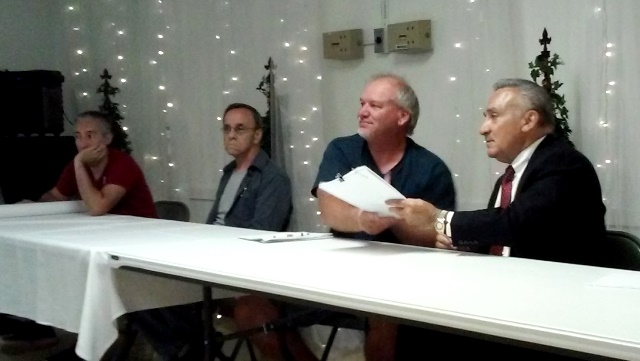
CLEARFIELD – Residents of the Goldenrod area of Lawrence Township gathered at the Masonic Lodge last night for a discussion with township officials regarding recent zoning changes made in the township.
Several areas of the township saw a change from Rural Suburban to Rural Agriculture zoning.
The residents of Rivers Bend and their neighbors are concerned about what the change could mean for the future of yet undeveloped properties and how it will affect their properties.
The residents for the most part allowed two representatives to speak for them, Warren “Tom” Bartholomew and Brian Marrow.
In addition to supervisors Randy Powell, Jeremy Ruffner and Dan Mitchell, solicitor James Naddeo and his partner, Linda Lewis, attended. Powell said they would answer whatever questions they were able to.
There are several areas of concern for the residents and Bartholomew first asked if the supervisors were able to reveal the names of the contractors who had first approached the township about possible zoning changes.
Powell responded that they couldn’t disclose that information. He explained that information like that is confidential until plans for development are finalized, such as filing for permits for a project.
After further questions, Powell also explained that zoning changes can be proposed a number of ways.
For example, a business might come to the township and say they are interested in locating there, and the supervisors would then look at zoning and decide if changes for that type of business could be made.
Naddeo added that property owners can also petition for zoning change and the supervisors could then consider the matter.
Because areas change in character over the years, zoning is something the supervisors keep in mind and review periodically.
Powell gave an example of why they might change zoning to encourage a more diverse population. He said several years ago, Cracker Barrel had looked into building in the area and looked at traffic, population and other items. He said companies like that look especially at population when considering location.
Naddeo added that most small communities are in financial trouble and one reason is lack of development and a stagnant tax base. Income stays the same for the municipality while costs go up.
For some years, the township had Act 13 monies to help, but those funds have steadily decreased and the supervisors are looking for ways to encourage development and population.
Merrow asked about whether the infrastructure in the area of concern, especially sanitary and storm sewers, would support an increased population.
Powell and Naddeo talked about how the state Department of Environmental Protection takes part in the permitting process and how if the infrastructure isn’t there, the project doesn’t go forward.
One of the most controversial questions has been how the proposed changes were advertised and the wording of the notices (both posted and published in local media) and the opposition of residents.
Bartholomew noted that a survey showed 141 homes oppose the change, two are in favor, three are non-committal and three are vacant. He asked if the supervisors would have done anything differently had they known.
Naddeo said the question called for speculation and advised the supervisors not to answer at that time. He said that when the public meeting was held for the zoning change, township residents attended and commented.
He added that the residents of this area have covenants that extend to the area re-zoned and those covenants affect what is done with the lots.
Residents fear that when the covenants come up for renewal in 2021 that the current owner of Rivers Bend would have enough votes, based on the number of lots, to overturn the covenants.
A discussion then ensued regarding which parcels were affected by the zoning change and how they were considered legally.
Maps were reviewed and the notice read and re-read several times, but the residents and supervisors did not come to a complete agreement about the matter.
Naddeo recommended several times that the residents should consult their own attorney or attorneys for their opinions on how the matter was advertised, how the properties are designated, etc. and also on the sanctity of the covenants.
He also asked that those who have consulted attorneys to have the attorneys contact him and explain their position to him so he has a better understanding of their position.
Bartholomew said the residents do not want to end up in court, but if that is what happens, they are prepared to hire an attorney and move in that direction.
However, he asked that he supervisors sit down with Naddeo and consider the situation. Both he and Merrow expressed a hope that a solution would be found that everyone could agree on.
Ultimately, because it was a work session, no decisions could be made. However, the supervisors agreed they will continue to look at the situation and work on a solution.
They thanked the residents for coming and voicing concerns, and Bartholomew and Merrow also thanked the supervisors and residents.
When a decision is made, it will be announced at a future supervisors’ meeting, which are held the first and third Tuesday of each month at the township building.



